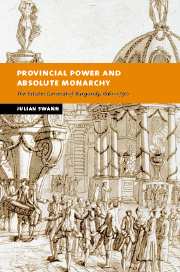Book contents
- Frontmatter
- Contents
- List of illustrations
- List of figures
- List of appendices
- List of map
- Preface
- List of abbreviations
- Map: The duchy of Burgundy in the eighteenth century
- 1 Historians, absolute monarchy and the provincial estates
- 2 Ancien régime Burgundy
- 3 The Estates General of Burgundy
- 4 Nosseigneurs les élus and the officers of the Estates
- 5 The provincial administration: authority and enforcement
- 6 ‘It's raining taxes’. Paying for the Sun King, 1661–1715
- 7 Provincial administration in an age of iron, 1661–1715
- 8 The limits of absolutism: crown, governor and the Estates in the eighteenth century
- 9 Provincial rivalries: the Estates and the Parlement of Dijon in the eighteenth century
- 10 Tax, borrow and lend: crown, Estates and finance, 1715–1789
- 11 An enlightened administration?
- 12 The coming of the French revolution in Burgundy, 1787–1789
- Conclusion
- Appendices
- Bibliography
- Index
8 - The limits of absolutism: crown, governor and the Estates in the eighteenth century
Published online by Cambridge University Press: 05 July 2009
- Frontmatter
- Contents
- List of illustrations
- List of figures
- List of appendices
- List of map
- Preface
- List of abbreviations
- Map: The duchy of Burgundy in the eighteenth century
- 1 Historians, absolute monarchy and the provincial estates
- 2 Ancien régime Burgundy
- 3 The Estates General of Burgundy
- 4 Nosseigneurs les élus and the officers of the Estates
- 5 The provincial administration: authority and enforcement
- 6 ‘It's raining taxes’. Paying for the Sun King, 1661–1715
- 7 Provincial administration in an age of iron, 1661–1715
- 8 The limits of absolutism: crown, governor and the Estates in the eighteenth century
- 9 Provincial rivalries: the Estates and the Parlement of Dijon in the eighteenth century
- 10 Tax, borrow and lend: crown, Estates and finance, 1715–1789
- 11 An enlightened administration?
- 12 The coming of the French revolution in Burgundy, 1787–1789
- Conclusion
- Appendices
- Bibliography
- Index
Summary
Historians are in agreement that Louis XIV's government was more effective than its predecessors in controlling the French provinces, even if they continue to quarrel about the means by which it was achieved. In Burgundy, the crown had been largely content to rely upon the services of the governor to manage the Estates, and the financial and other demands of the crown were worked out in consultation with Chantilly. The role of the intendant, while important, had never been all powerful, and successive incumbents were obliged to work with the governor or risk dismissal. During the early years of the new reign, the duc de Bourbon continued the family tradition by jealously guarding his authority in the province, his determination undoubtedly redoubled after the failure of his brief spell as Louis XV's first minister. The premature death of Bourbon in January 1740 threw his family and the province into consternation. His son, Louis-Joseph, the new prince de Condé, was a child of four, and the resulting interregnum offered the crown a golden opportunity to tighten its control over the Estates.
The interim governor, the duc de Saint Aignan, was no more than a figurehead, who did little beyond presiding at the triennial meetings of the Estates. The crown was forced to fill the resulting power vacuum, issuing a string of règlements designed to limit the powers and police the activities of both the Estates and the élus.
- Type
- Chapter
- Information
- Provincial Power and Absolute MonarchyThe Estates General of Burgundy, 1661–1790, pp. 230 - 261Publisher: Cambridge University PressPrint publication year: 2003



